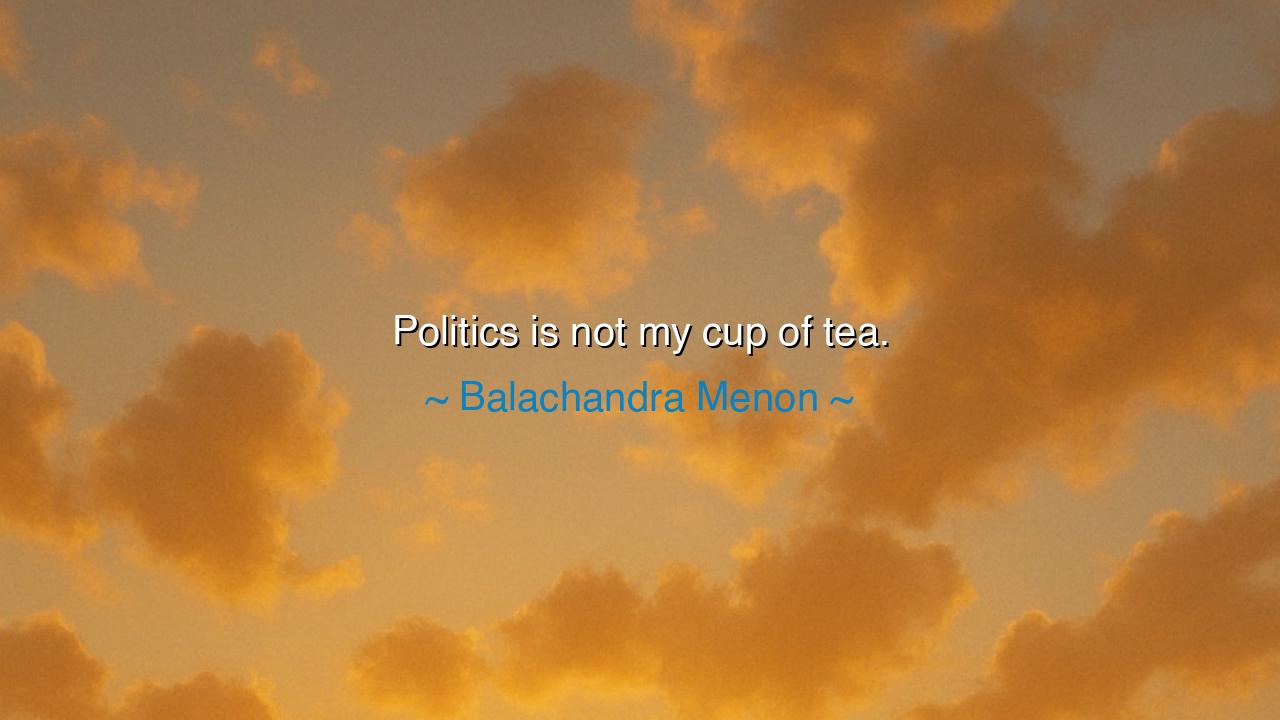
Politics is not my cup of tea.






When Balachandra Menon confessed, “Politics is not my cup of tea,” he spoke with the candor of one who knew his path lay elsewhere. His words reveal a truth as old as humanity: not every soul is fashioned for the turbulence of politics, that realm of conflict, ambition, and compromise. Some are called to art, some to teaching, some to healing, and it is wisdom, not weakness, to know where one’s strength lies. To say politics is not one’s “cup of tea” is to admit that the taste of that drink, though suited for others, does not nourish the spirit within.
The ancients often wrestled with this balance. Plato urged the philosopher to enter politics, yet acknowledged that many would recoil from its corruption and noise, preferring the quiet pursuit of truth. Menon’s words echo this ancient struggle—the recognition that politics is not merely governance but battle, and that those who thrive in its fire must be willing to bear scars upon their spirit. Not all are meant to fight in this arena, and it is no dishonor to stand apart.
History offers examples of those who turned away from politics to preserve their calling. Leonardo da Vinci, though courted by kings and princes, avoided the entanglements of political power, choosing instead to pour his genius into art, invention, and the study of nature. In so doing, he left a legacy untouched by the venom of court intrigue. His refusal to drink from that cup preserved the clarity of his vision—just as Menon’s rejection of politics preserved his artistry.
And yet, Menon’s words are not a condemnation of politics, but a declaration of individuality. For every person who governs, there must also be those who sing, those who write, those who heal, and those who build. A society cannot live on politics alone; it requires the balance of many crafts, each nourished by its own cup. To know which drink is yours is to walk the path of wisdom, not to stumble in envy of another’s portion.
Thus, let this teaching be passed to future generations: do not drink every cup offered to you. Some are brewed for your strength, others for your downfall. If politics is not your cup of tea, do not force it down, but instead seek the cup that fills your spirit with purpose. For greatness lies not in striving for what others exalt, but in walking faithfully in the calling that is truly your own.






YNNguyen Thi Yen Nhi
I can definitely relate to this quote, especially when politics seems so far removed from everyday life. But it also makes me wonder—does this attitude of avoidance lead to apathy, or is it a way of rejecting a system that feels broken? In the long run, what do we lose by not being more involved in the political process, and what steps can be taken to make politics more approachable for those who feel like it’s ‘not their cup of tea’?
TPThanh Phuong
Balachandra Menon’s view seems to reflect a common sentiment, especially when politics becomes overwhelming or frustrating. But I’m curious—does this feeling of disinterest come from a place of not understanding the importance of politics, or simply from feeling powerless within the system? Are there ways to become more politically active without feeling drained by it, and could that shift the way we view politics?
MMdodmd9dmod
I completely understand this perspective, especially in a time when political discourse can often feel toxic and divisive. It’s tempting to avoid politics altogether. However, it raises the question: Is staying out of politics really a luxury everyone can afford? For some, political decisions affect their daily lives in very direct ways. Does this mean we all have a responsibility, no matter how small, to engage with politics?
ADMAI ANH dO
This quote really captures the feeling that many people have towards politics—disengaged or disillusioned. It’s easy to think of politics as a distant issue, especially when it feels like nothing changes. But if we don’t participate, is there a risk that the system becomes even more disconnected from our needs? Could there be ways to make politics more relatable and less overwhelming for those who feel the way Balachandra Menon does?
TN11_1-Nguyen Trung Nhan
I get the sentiment behind this quote. Politics can often seem like a complex and frustrating world, and it’s easy to feel disconnected from it. But I wonder, can we afford to ignore politics entirely? While it might not be everyone's favorite thing, don’t we all end up affected by political decisions in some way? How can we balance our disinterest with the reality that politics influences so much of our lives?